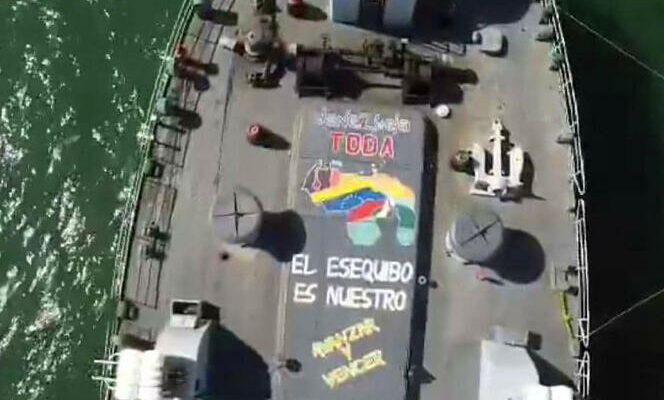On one side, a British warship armed with 30mm cannons; on the other, more than five thousand Venezuelan soldiers, F-16 and Sukhoi fighter planes and amphibious vehicles. Is the peace declaration signed between Guyana and Venezuela on December 14 regarding the territorial conflict between the two South American countries already obsolete?
Great Britain’s dispatch of the “HMS Trent”, which arrived on Friday December 29 off the coast of Guyana, is considered by Nicolas Maduro as “an act of hostile provocation and a violation of the recent declaration” of peace. In response to this “unacceptable threat”, the Venezuelan president therefore launched military exercises on Thursday “joint action of all Bolivarian national armed forces » and the deployment of troops by air, land and sea near the border with Guyana.
“Venezuela cannot stand idly by in the face of this aggression”, launched the Head of State on television, surrounded by senior officers of the armed forces, after giving the green light to the operation: “Deploy, into battle!” » Venezuelan television channels then showed images of fighter jets patrolling above warships and soldiers equipped with missile launchers. These military exercises are “unjustified and should stop”the United Kingdom reacted the next day.
Guyana, for its part, does not consider the arrival of the British patrol boat as a breach of the declaration of peace. Georgetown has no “no plan” to attack Venezuela, “President Maduro knows this and should not worry”declared Thursday the vice-president, Bharrat Jagdeo, specifying that the arrival of the ship was part of the “long-planned routine exercises”.
An “imprudence”
The “HMS Trent”, usually based in the Mediterranean and sent to the Caribbean at the beginning of December to fight against drug trafficking, is due to participate in military exercises in Guyanese waters during ” less than a week “. As the port of Georgetown is not deep enough, it is not planned to dock there.
The tension, at its height on Friday, had however subsided after the signing by Mr. Maduro and his Guyanese counterpart, Irfaan Ali, of the Argyle declaration – named after the airport of Saint Vincent and the Grenadines where The meeting was held on December 14, in which Caracas and Georgetown agreed not to use threat or force in the territorial conflict that has opposed them for more than one hundred and eighty years around the Essequibo. This territory of 160,000 km2rich in oil and natural resources, is administered by Guyana and claimed by Venezuela.
You have 55% of this article left to read. The rest is reserved for subscribers.
